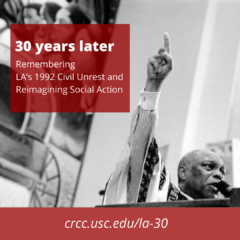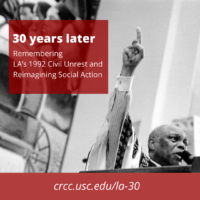In the decade since CRCC published “Forging a New Moral and Political Agenda,” Los Angeles has seen the development of a new civil rights movement in Black Lives Matter, the resurgence of white supremacy and the Donald Trump presidency, plus a global pandemic. During that time, faith-based social action has expanded and evolved.
The predominant story about religion in the past decade has been about either decline or right-wing Christianity. While a growing number of Americans are not affiliated with faith organizations, CRCC’s research on religion in Los Angeles has found that groups are adapting—finding their vitality not necessarily in the number of congregants attending worship but in how they have embedded their organizations within their local communities in order to make positive social change.
In sharing his model of community development, Rev. Murray has always advocated teaching people not only how to fish, but how to own the pond. An increasing number of faith-based community development corporations, non-profit organizations and social enterprises have embraced this approach. Their efforts seek to bring job training and employment opportunities into communities and empower people with financial literacy. Such efforts give agency to individuals, ultimately allowing them to become less dependent on charity.
Those inspired by faith also seek make change within the halls of power—running for local political offices, expanding interfaith power-building to help move issues forward and using media to speak to social justice issues. Faith leaders understand that they can take their message to the people directly rather than waiting on the media to call them.
Certainly, civil unrest is still in the realm of possibility in the context of increasing inequalities and continued state violence. At the same time, massive protests for social change—such as the 500,000 people immigration rally in 2006, the Occupy movement, the Women’s March in response to Trump’s election, and Black Lives Matter protests—have largely remained non-violent at the urging of activists and faith leaders.
Perhaps the most significant test of this commitment to nonviolent social action came in 2020, just two years before the 30th anniversary of Los Angeles civil unrest. In 2020, the murder of George Floyd at the hands of police in Minneapolis, closely following the murder of Breonna Taylor by police in Louisville, KY, sparked protests nationally. In Los Angeles, businesses boarded up their windows and the Los Angeles Police Department donned riot gear, expecting a repeat of 1992. The mayor’s office called on the Rev. Dr. Najuma Smith-Pollard, spiritual daughter of Rev. Murray, to speak at a press conference broadcast on all major TV stations and social media.
Rev. Smith-Pollard invoked Rev. Murray’s leadership in 1992 in that speech. “Dr. Murray, when he spoke 30 years ago, wanted us to stand and speak and live in power,” she said. “In power, we stand. In power, we speak. In power, we rise up. But power has a responsibility.”
Read it here, or start at 10:40 to hear it:
Despite some looting and violence, the scale of peaceful protests far eclipsed any destruction. Police efforts to control the crowds were seen as overreaction and unnecessary aggression.
A year later when a verdict was due for Derek Chauvin, the police officer who killed George Floyd, Rev. Smith-Pollard published an OpEd about how she and other faith leaders were following in the footsteps of Rev. Murray by gathering for the verdict. “We will be there to process our collective pain and focus our passion on continuing to build a better future,” she wrote.
Whether or not faith leaders and activists in Los Angeles today explicitly trace their work back to the organizing following the 1992 civil unrest, Rev. Murray and his many partners’ efforts to rebuild the city lay the groundwork for their work today.
The Next Generation
Below are current examples of faith organizations doing the work of social justice and community development in Southern California. Some emerged out of the 1992 civil unrest, some of them directly descend from Rev. Murray’s example, and others have developed out of the context of a broadened landscape for faith groups to be active in the public square.
Faith and Community Empowerment (FACE LA), originally Korean Churches for Community Development, connects churches with resources to pursue community development and civic engagement work. Its founder, Hyepin Im, learned about the role that churches could play in uplifting their communities working with Rev. Cecil Murray and Rev. Mark Whitlock at FAME following the civil unrest.
Members of The Row, the “Church Without Walls,” congregate on the corner of Wall St. and Winston St. in the middle of downtown LA’s Skid Row every Friday night. Pastor Cue Jn-Marie, an alumnus of the USC Murray Center, uses his training to engage with city leaders about racial and economic justice and the future of the Skid Row neighborhood. He also opened The Hip Hop Smoothie Shop, a social enterprise serving the Skid Row and other under-resourced communities.
Centro de Vida Victoriosa, an Assemblies of God ministry in East Los Angeles, launched Instituto de Avance Latino Community Development Corporation (“IDEAL CDC”) to bring economic and community development programs to its community. For instance, the Ideal Wealth Academy offers financial management coaching to parents and teens together. Pastors Carlos and Amparo Rincon and IDEAL’s executive director Dorima Rincon-Hamilton have all participated in the USC Murray Center’s programming. Read more about their work in CRCC’s report “Community Transformation: Outlining a Process for Change.”
Dignity and Power Now (DPN), a grassroots organization in Los Angeles, works to end mass incarceration. In this video, leaders and participants describe how they have created a new spiritual community through this Black Lives Matter-affiliated organization. Its leaders have sought the counsel of Rev. Murray, even as its practice of “radical inclusion” and embrace of female and queer leadership disrupts a legacy of largely male, heteronormative leadership in traditional Black faith groups. DPN represents the front lines of new community development, founded on notions of self-care, resilience and transformative justice, and rooted in new conceptions of spirituality and activism.
Pico-Union Project is a community center built in a synagogue-turned-church, bought in 2012 by Craig Taubman, a Jewish artist and performer. It has incubated several Jewish, Muslim and Christian congregations. Located in a diverse and economically challenged neighborhood, it provides weekly distribution of free fresh produce, mentoring for high school students, art programs and concerts and assistance for homeless neighbors. When Taubman was considering buying the building, he looked to the example of Rev. Murray and Rev. Whitlock and sought their counsel. Their encouragement was instrumental in Taubman’s starting the Pico-Union Project. Rev. Murray was honored with Pico-Union Project’s 2022 Visionary Award.
5,000 Pies is an example of how a faith group can improve their community through social enterprise, an increasing trend in social action today. The small, storefront restaurant is operated by Fountain of Life Covenant Church in a multi-ethnic and economically challenged neighborhood on the west side of Long Beach, California. The pizza place allows the church to serve the needs of its community, with not only good food but also job training, mentoring and life skills for young adults.
Matthew25/Mateo25 is an evangelical organization that seeks to support immigrants, started in response to anti-immigrant policies enacted by the Trump administration. Engaging both immigrant and non-immigrant churches, Matthew25 responds to both the immediate needs (housing, direct services, trauma counseling) and legal needs of asylum seekers and families facing separation through deportation. They also conduct education, leadership development and policy advocacy as part of their work to support immigrants.
Finally, longstanding groups—LA Voice, CLUE-LA (Clergy and Laity United for Economic Justice) and OneLA—are active in promoting an interfaith moral agenda in Los Angeles through community organizing, policy advocacy and training and education for faith leaders and communities. LA Voice and OneLA both existed before 1992, but became major forces following the civil unrest. The organizing of clergy to back a living wage law at the Los Angeles city council in 1996 led to the formation of CLUE. As part of their effort today, faith leaders sought to correct the inequities that led to the unrest through public policy advocacy.
Today, city leaders, policy makers and the public have come to expect faith actors to be involved in community development and civic engagement efforts. At the same time, the expectation that faith communities will do the work of caring for the most vulnerable comes with little support, either in the form of resources or education about how to carry out community development work. Moreover, clergy and lay leaders often see this work as ancillary to the business of running a congregation.
As CRCC has for the last 25 years, we will continue to work with faith groups that seek to live out their beliefs and commitments—both spiritual and social—to confront current inequalities and to bring positive change to the lives of individuals and the communities in which they live, work and worship.

